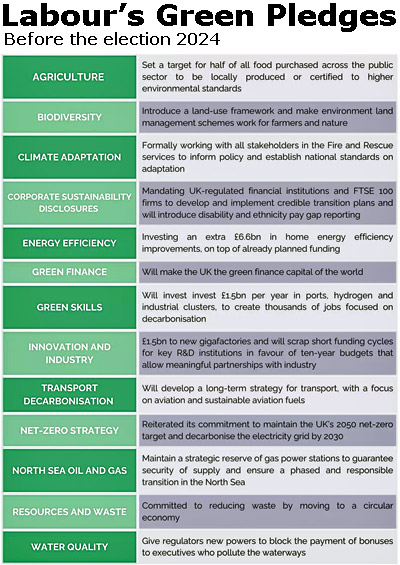 |
|
|
|
Climate Change puts Earth into critical condition - Best hope Labour Policies were crucial - Starmer acquiesces to Trump and corporate lobbyists Growth at all costs - even the planets and the future of our children's children
The Labour Government's current stance on climate policy, highlighting a shift from its previously strong green agenda to prioritizing economic growth, even at the expense of environmental sustainability. The fossil carbon states and corporations with their coal, oil and gas markets, meanwhile, are more certain about their prospects and happy to promote their wares with enthusiasm. There were 2,500 oil, gas and coal lobbyists at the 2023 Dubai COP28 climate summit, four times as many as attended the previous year in Egypt, reports openDemocracy's Paul Rogers in a recent article for the independent on-line news outlet.
1. North Pole temperatures were 20°C above average, surpassing ice's melting point.
- Supporting Heathrow's third runway, despite climate campaigners' warnings. Labour's actions within broader global challenges, including increased fossil fuel lobbying at COP28 and setbacks in international climate leadership under Donald Trump's administration, are heavily criticised by climate change experts and pressure groups not concerned with financial gains, but the future of the UK and of humanity. These decisions contrast sharply with Labour's previous strong green agenda and coincide with concerning global developments: - Donald Trump's return to office in the US, potentially undermining climate efforts.
- Professor James Hansen states that the 2°C temperature rise limit agreed in Paris is "dead". Despite these challenges, there are some positive developments: - Renewable energy costs continue to decrease. To address the climate crisis effectively, the following actions are suggested: 1. Rapid expansion of renewable energy sources. Funding for these initiatives could come from various sources, including: - Rigorous control of tax evasion and avoidance. Critics argue that Labour has lost its sense of mission and forgotten its history of taking on seemingly impossible tasks. The party's current focus on growth at the expense of environmental protection is seen as a departure from its earlier commitments to addressing the climate crisis. However, openDemocray's Paul Rogers seems more positive at one point in his assessment of the UK's ability to change policy. He writes: "At a lower level, there is some good news at least. The cost of producing electricity from renewable sources is continuing to fall and the whole process of embracing renewables could accelerate if just one or two countries demonstrated just how quickly change can come. However, whilst many critics point out that Labour has time to amend it's policies, their comparison to the ambitious goals and achievements of the late 1940s, under Clement Attlee’s government, is striking. At that time, the party was deeply rooted in social justice, nationalization, and post-war rebuilding—undertakings that seemed daunting but were ultimately successful. The current Labour Party, however, does seem somewhat disconnected from that kind of bold mission. Many might argue that a shift towards pragmatism, or the need to cater to more centrist views, has watered down the party’s transformative potential. If Labour is to regain its sense of purpose and vision, it will likely need to return to those principles of radical reform that once defined it. But, given the current political landscape; it’s hard to believe that will happen. Just don't risk holding your breathe! Source: BBC.com / IBC.co.uk / Ground.news / Tax Research.org.uk / Nature.com / UKandeu.ac.uk / Charity Digital.org.uk / BBC.co.uk / Carbonbrief.org / preventionweb.net / openDemocracy
|

 The Labour Party's recent shift in climate policy has raised concerns about their commitment to addressing the climate crisis. Rachel Reeves and Keir Starmer appear to be prioritising economic growth over environmental protection, despite alarming climate indicators, and the reality that the Earth's future and that of humanity is at a crucial stage.
The Labour Party's recent shift in climate policy has raised concerns about their commitment to addressing the climate crisis. Rachel Reeves and Keir Starmer appear to be prioritising economic growth over environmental protection, despite alarming climate indicators, and the reality that the Earth's future and that of humanity is at a crucial stage.
 Labour's policy changes include:
Labour's policy changes include: Climate scientists warn that the situation is dire:
Climate scientists warn that the situation is dire: